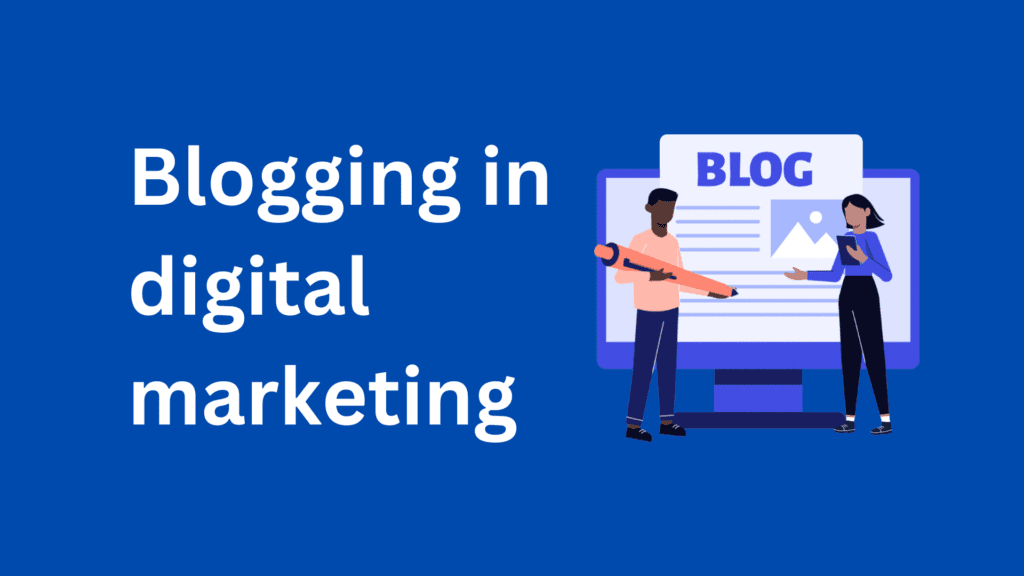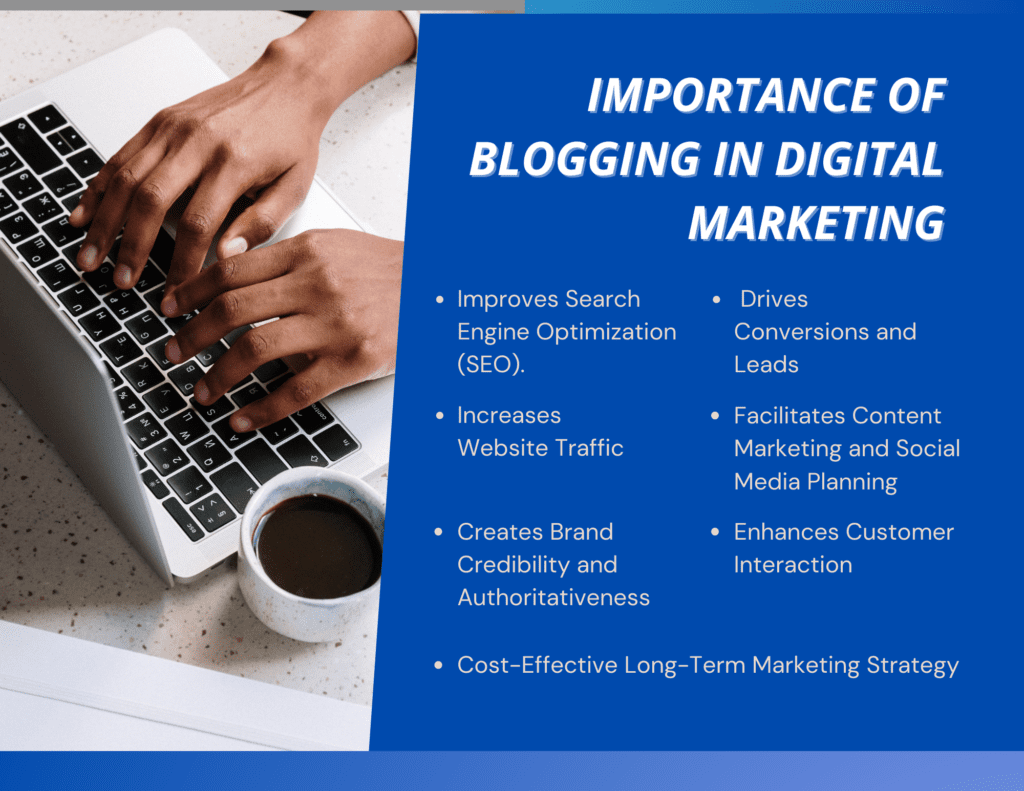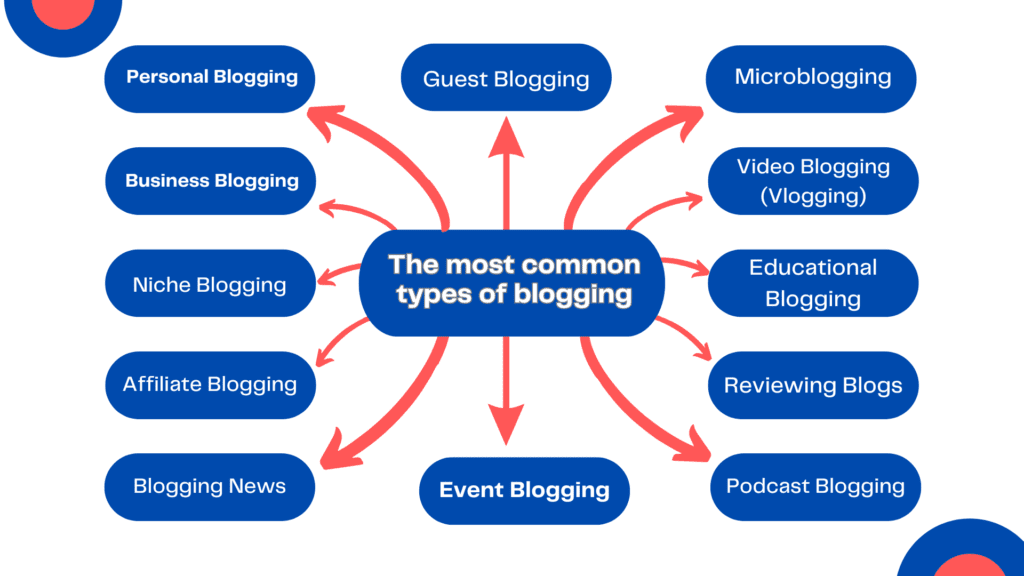What is Blogging in Digital Marketing?

Online marketing blogging is an excellent way of capturing, engaging, and converting prospects with informative content. Blogging not only establishes brand authority but also enhances website search engine presence. When blogging for optimization, it is essential to understand which on-page element carries the most weight for SEO (search engine optimization)—this is usually title tag, then headers, meta descriptions, and internal linking. A well-optimized blog with specific keywords, attractive headings, and related content can dramatically increase organic traffic and search rankings. Blogging regularly also keeps your site fresh and communicates relevance to search engines.
Table of Contents
ToggleInternet marketing blogging is writing and publishing text content (referred to as blog posts) on a website to draw, inform, and engage an audience. Companies utilize blogging to drive traffic to websites, improve SEO (Search Engine Optimization), establish credibility for a brand, and create leads or sales.
A good blog post provides valuable information, responds to questions, or solves problems for readers. Frequent blogging enables brands to gain trust and engage more with their target audience in the long term.
Blogging in digital Marketing

Blogging about online marketing is the act of creating and posting content on a website to attract and engage an audience. Such blogs inform, educate, and entertain people while using SEO strategies to help improve search engine ranking. Through informative content, companies can showcase expertise in the industry, generate leads, and establish customer relationships.
A blog post is typically composed of words, images, charts, and videos that engage readers. Effective blogging aligns company goals and provides solutions to customer issues.
Importance of Blogging in Digital Marketing

Blogging is a critical component of online marketing. It has a number of advantages that contribute to business development online, draws potential customers, and keeps existing ones. The following are the primary reasons why blogging is crucial in online marketing:
- Improves Search Engine Optimization (SEO).
Daily blogging makes a website current and fresh, something search engines like.
Blogs assist in reaching targeted keywords, enhancing website rankings in search pages.
Quality content attracts backlinks, and that enhances domain authority and visibility.
- Increases Website Traffic
Blogs serve as gateways for users looking for answers, resulting in organic traffic.
Social media provides sharing of blog posts, which enhances visibility and attracts new readers.
Internal linking within blogs makes users engage, reducing bounce rates.
- Creates Brand Credibility and Authoritativeness
Sharing industry tips, insights, and case studies makes companies experts.
Educational blogs aid in establishing trust and building relationships with customers.
Individuals tend to purchase from and engage with familiar brands.
- Drives Conversions and Leads
Blogs with CTAs encourage people to subscribe, download, or purchase something.
Good content guides the potential customer through the buying process.
Educational blog posts help to respond to customer inquiries, resulting in more sales.
- Facilitates Content Marketing and Social Media Planning
Blog articles can be reused on social media, email newsletters, and advertising.
Interactive content gets individuals talking and increases engagement on social media.
Blogging with others makes businesses up-to-date and in touch with their customers.
- Enhances Customer Interaction
Commented blogs and blog discussions encourage community-building.
Personal experiences and storytelling make brands relatable.
Interacting with blog comments develops customer relationships.
- Cost-Effective Long-Term Marketing Strategy
In contrast to sponsored ads, blogs keep bringing traffic and leads in the long run.
A single blog post can provide lasting value, increasing ROI. Blogs, updated consistently, make a brand current within a competitive marketplace.
The most common types of blogging

- Personal Blogging
Conversations related to sharing individual emotions, concepts, and beliefs.
Typically accessed like an online diary.
- Business Blogging
It is employed by businesses to promote their brand and engage with customers.
Wants to bring in visitors, create potential customers, and increase sales.
- Niche Blogging
Refers to a particular subject, i.e., travel, health, technology, or finance.
Brings in a loyal following interested in that specialty.
- Affiliate Blogging
Sells items and earns money using affiliate links.
Bloggers create product review articles, comparison articles, and buying guides.
- Blogging News
Reports on industry news, popular issues, and international events.
Regularly updated often to remain current.
- Guest Blogging
Writing articles on other blogs contributes towards obtaining backlinks and creating authority.
Assists in improving SEO and increasing brand exposure.
- Microblogging
Brief blog post on platforms like Twitter, Tumblr, or LinkedIn.
Emphasizes rapid insights, breaking news, or interesting conversations.
- Video Blogging (Vlogging)
Creating blogs in video format, usually posted on YouTube, Instagram, or TikTok.
Applied to educational purposes, day-to-day life ideas, and advertisement.
- Educational Blogging
Offers lessons, courses, and tutorial instructions.
Usually employed by professionals, teachers, and business experts.
10. Reviewing Blogs
Bloggers write reviews and test products or services.
Leads readers to make good decisions.
11. Podcast Blogging
It combines written blog articles with audio material.
Used in interviews, stories, and expert presentations.
12. Event Blogging
Designed for short advertising of specific events (e.g., festivals or new product launches). Can be extremely profitable if well-timed.
How Blogging Helps in Digital Marketing?
Boosts SEO & Organic Traffic – Blogs rank for certain keywords, which allows them to rank higher on search engines.
Establishes Trust – Consistent, well-researched blogs make readers believe and trust you.
Drives Leads & Conversions – Blogs lead potential buyers through the buying process with CTAs.
Increases Social Media Presence – Social media interaction can repurpose blog content.
Develops Customer Relationships – Excellent content earns loyalty and return visits
Top Blogging Strategies for Internet Marketing
Keyword Research and SEO Optimization – Utilize search-relevant keywords, meta tags, and linking to other related pages.
Create quality content – Emphasize content that is informative, interactive, and original.
Regular Publishing – Publishing regularly keeps the audience engaged and search engines happy.
Content Promotion – Promote on social media, via email marketing, and on forums.
Analytics & Improvement – Monitor performance and refine for enhanced engagement and rankings.
Digital Marketing Blogs for Beginners
In the current rapid online environment, digital marketing is a valuable asset for individuals and companies. For new entrants in this evolving sector, staying current and learning from professionals is necessary. One of the best methods of starting is by reading digital marketing blogs that simplify complex issues and provide helpful tips.
Why Read Digital Marketing Blogs? Blogs are also full of helpful tips, business news, strategies, and simple guides. They instruct new individuals on the fundamentals of SEO, content marketing, social media, PPC, and email marketing, many of which use live examples and free tools.
Steps to Start Blogging in Digital Marketing
Creating a blog for internet marketing involves conceptualization, development, enhancement, and deployment of content to attract visitors and secure new clients. The following is a step-by-step guide:
- Establish Your Blogging Objectives
Are you blogging for brand awareness, lead generation, or SEO?
Find out your target audience and their pain points.
- Choose a Topic and Blog Topics
Consider a specific industry, e.g., digital marketing, SEO, or PPC.
Research trending topics and audience interests.
- Select a Blogging Platform and Domain Name
Platforms: WordPress (most popular), Blogger, Medium, Wix.
Domain Name: Pick a short, easy-to-remember, and SEO-friendly name (e.g., DigiAdBoost.com/blog).
- Host and Blog Design Setup
Select a good web host (SiteGround, Bluehost, Hostinger).
Choose an SEO-friendly and responsive blog theme.
- Conduct Keyword Research
Use Google Keyword Planner, Ahrefs, or Ubersuggest to find high-search, low-competition keywords.
Target long-tail keywords to rank higher.
- Create High-Quality Blog Posts
Create a good title (Utilize key words).
Create engaging, relevant, and search-friendly content.
Include images, infographics, and videos for ease of reading.
Make sure the call-to-action (CTA) is prominent (e.g., Subscribe, Contact Us).
- Optimize for SEO
Add keywords in title, meta description, headers, and URL.
Add hyperlinks within and outside.
Employ schema markup and structured data.
- Share Your Blog
Share on social media (LinkedIn, Twitter, Facebook, Instagram).
Send email notifications to inform subscribers.
Convert content into video, clips, and graphics.
- Monetize Your Blog (Optional)
Google AdSense, affiliate marketing, sponsored posts, or selling online products.
- Track and Improve Performance
Use Google Analytics and Google Search Console to monitor traffic and rank. Refresh outdated content and improve it based on learnings.
